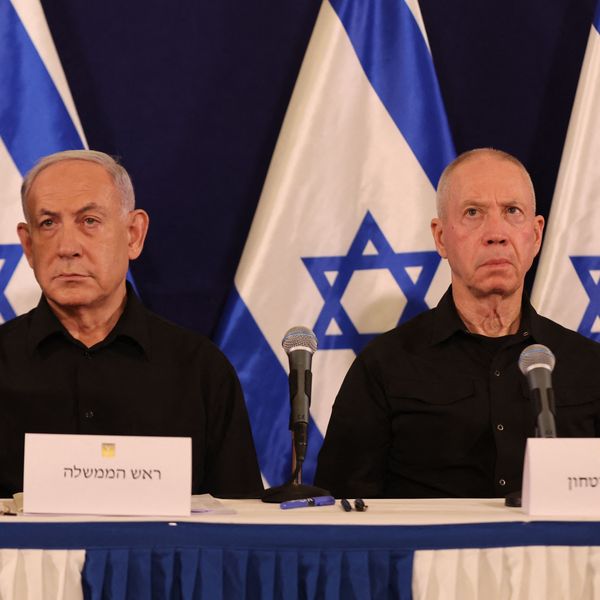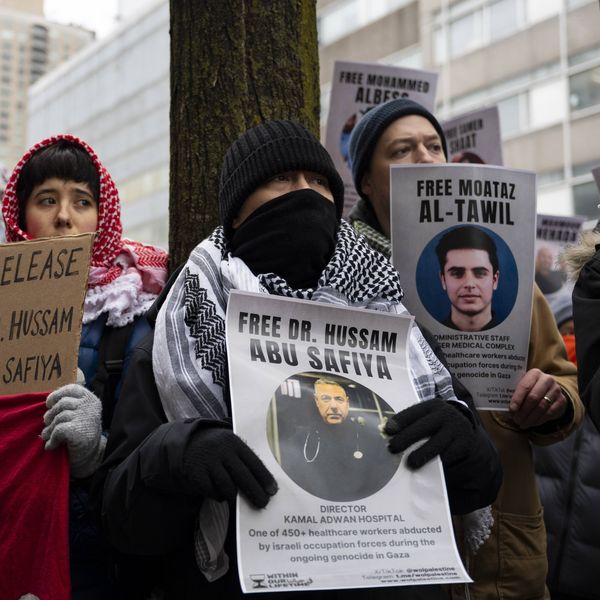
Demonstrators, including members of the Tamimi family, rallied on Dec. 22, 2017 in Manhattan's Union Square to demand the release of Ahed Tamimi. (Photo: Joe Catron/flickr/cc)
Continued Detention of Ahed Tamimi Denounced as Symptomatic of Israel's Flouting of Int'l Law
"It is clear that detaining and prosecuting Palestinian children in Israeli military courts has little to do with justice," says Brad Parker of Defense for Children International Palestine
Human rights experts sounded alarm on Wednesday after an Israeli military judge ruled that 16-year-old Ahed Tamimi--a child who has not been convicted of a crime--must remain in custody during her trial.
While the court ruled there was no "alternative to custody," Magdalena Mughrabi, deputy director for the Middle East and North Africa at Amnesty International, said, "There is nothing that can justify Ahed Tamimi's continued detention."
The teen was arrested last month after slapping IDF soldiers outside her home in the occupied West Bank--an action she took shortly after soldiers shot her 15-year-old cousin in the head.
As the Jerusalem Post notes, viral video of the slapping event shows "there is no sign her small size presented any danger, and the [armed] soldiers mostly ignored her."
Rights groups say Tamimi's arrest and detention are symptomatic of Israel's treatment of Palestinian children.
Her "outrageously excessive" ongoing detention and military court trial, said Mughrabi, are "an example of the institutional discrimination typical of the treatment of Palestinian children who participate in activism against the Israeli occupation and shows how Israel is violating its international human rights obligations towards children."
Echoing that comment, Brad Parker, international advocacy officer and staff attorney for Defense for Children International Palestine, said, "Ahed's pretrial detention, rather than the exception, is the norm in the Israeli military detention system where international law is routinely disregarded, including that detention must only be a measure of last resort.
"It is clear that detaining and prosecuting Palestinian children in Israeli military courts has little to do with justice," Parker said.
"Israeli military law," he added, "denies basic fair trial rights and ill-treatment of child detainees is widespread with nearly three out of four Palestinian children experience some form of physical violence after arrest."
B'tselm, the Israel-based human rights group, also denounced the treatment of Tamimi and Israel's military court system, calling the latter "a major tool of oppression serving Israel's control over Palestinians in the Occupied Territories."
An Urgent Message From Our Co-Founder
Dear Common Dreams reader, The U.S. is on a fast track to authoritarianism like nothing I've ever seen. Meanwhile, corporate news outlets are utterly capitulating to Trump, twisting their coverage to avoid drawing his ire while lining up to stuff cash in his pockets. That's why I believe that Common Dreams is doing the best and most consequential reporting that we've ever done. Our small but mighty team is a progressive reporting powerhouse, covering the news every day that the corporate media never will. Our mission has always been simple: To inform. To inspire. And to ignite change for the common good. Now here's the key piece that I want all our readers to understand: None of this would be possible without your financial support. That's not just some fundraising cliche. It's the absolute and literal truth. We don't accept corporate advertising and never will. We don't have a paywall because we don't think people should be blocked from critical news based on their ability to pay. Everything we do is funded by the donations of readers like you. Will you donate now to help power the nonprofit, independent reporting of Common Dreams? Thank you for being a vital member of our community. Together, we can keep independent journalism alive when it’s needed most. - Craig Brown, Co-founder |
Human rights experts sounded alarm on Wednesday after an Israeli military judge ruled that 16-year-old Ahed Tamimi--a child who has not been convicted of a crime--must remain in custody during her trial.
While the court ruled there was no "alternative to custody," Magdalena Mughrabi, deputy director for the Middle East and North Africa at Amnesty International, said, "There is nothing that can justify Ahed Tamimi's continued detention."
The teen was arrested last month after slapping IDF soldiers outside her home in the occupied West Bank--an action she took shortly after soldiers shot her 15-year-old cousin in the head.
As the Jerusalem Post notes, viral video of the slapping event shows "there is no sign her small size presented any danger, and the [armed] soldiers mostly ignored her."
Rights groups say Tamimi's arrest and detention are symptomatic of Israel's treatment of Palestinian children.
Her "outrageously excessive" ongoing detention and military court trial, said Mughrabi, are "an example of the institutional discrimination typical of the treatment of Palestinian children who participate in activism against the Israeli occupation and shows how Israel is violating its international human rights obligations towards children."
Echoing that comment, Brad Parker, international advocacy officer and staff attorney for Defense for Children International Palestine, said, "Ahed's pretrial detention, rather than the exception, is the norm in the Israeli military detention system where international law is routinely disregarded, including that detention must only be a measure of last resort.
"It is clear that detaining and prosecuting Palestinian children in Israeli military courts has little to do with justice," Parker said.
"Israeli military law," he added, "denies basic fair trial rights and ill-treatment of child detainees is widespread with nearly three out of four Palestinian children experience some form of physical violence after arrest."
B'tselm, the Israel-based human rights group, also denounced the treatment of Tamimi and Israel's military court system, calling the latter "a major tool of oppression serving Israel's control over Palestinians in the Occupied Territories."
Human rights experts sounded alarm on Wednesday after an Israeli military judge ruled that 16-year-old Ahed Tamimi--a child who has not been convicted of a crime--must remain in custody during her trial.
While the court ruled there was no "alternative to custody," Magdalena Mughrabi, deputy director for the Middle East and North Africa at Amnesty International, said, "There is nothing that can justify Ahed Tamimi's continued detention."
The teen was arrested last month after slapping IDF soldiers outside her home in the occupied West Bank--an action she took shortly after soldiers shot her 15-year-old cousin in the head.
As the Jerusalem Post notes, viral video of the slapping event shows "there is no sign her small size presented any danger, and the [armed] soldiers mostly ignored her."
Rights groups say Tamimi's arrest and detention are symptomatic of Israel's treatment of Palestinian children.
Her "outrageously excessive" ongoing detention and military court trial, said Mughrabi, are "an example of the institutional discrimination typical of the treatment of Palestinian children who participate in activism against the Israeli occupation and shows how Israel is violating its international human rights obligations towards children."
Echoing that comment, Brad Parker, international advocacy officer and staff attorney for Defense for Children International Palestine, said, "Ahed's pretrial detention, rather than the exception, is the norm in the Israeli military detention system where international law is routinely disregarded, including that detention must only be a measure of last resort.
"It is clear that detaining and prosecuting Palestinian children in Israeli military courts has little to do with justice," Parker said.
"Israeli military law," he added, "denies basic fair trial rights and ill-treatment of child detainees is widespread with nearly three out of four Palestinian children experience some form of physical violence after arrest."
B'tselm, the Israel-based human rights group, also denounced the treatment of Tamimi and Israel's military court system, calling the latter "a major tool of oppression serving Israel's control over Palestinians in the Occupied Territories."

